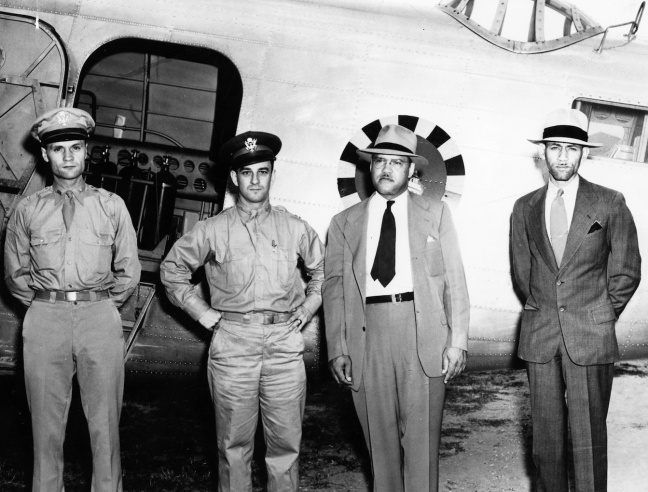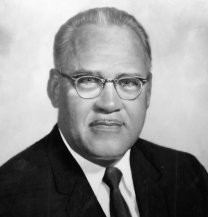
While president of Tuskegee Institute, Frederick Douglass Patterson, second from right, established an aviation program that led to the creation of the nation's first Black flying squadron. The Tuskegee Airmen were celebrated for their service in World War II. Photo courtesy of Tuskegee University. Larger image.
AMES, Iowa – The newly named home of Iowa State University’s College of Veterinary Medicine commemorates one of its most accomplished graduates, a tenacious trailblazer whose leadership diversified the veterinary profession and made higher education possible for countless Black students.
Naming the college’s academic building after Dr. Frederick Douglass Patterson culminates the college’s yearlong celebration of the 100th anniversary of his graduation with a doctorate in veterinary medicine in 1923. After receiving a second ISU degree in 1927, a master’s in veterinary pathology, Patterson served as president of Tuskegee Institute for nearly two decades before founding the United Negro College Fund (UNCF). In 1987, a year before his death, Patterson was awarded the Presidential Medal of Freedom by President Ronald Reagan.
A College of Veterinary Medicine ceremony Oct. 4 will celebrate the naming of Patterson Hall, which the Iowa Board of Regents approved in June. Patterson Hall opened in 1976 and is the university’s largest building. It was previously unnamed and known simply as the College of Veterinary Medicine building.
“We are proud to honor the incredible impact Dr. Patterson has had on veterinary medicine, veterinary medicine education and higher education in general,” said Dr. Dan Grooms, the Dr. Stephen G. Juelsgaard Dean of Veterinary Medicine. “When I think about what he was able to accomplish, it astounds me.”
As president of what’s now Tuskegee University, Patterson launched the aviation program that trained pilots who served as Tuskegee Airmen, the U.S. military’s first Black flying squadron and a decorated unit in World War II. He also created a veterinary school at Tuskegee, which nearly 80 years later remains the only veterinary program at a historically Black university. More than 70% of Black veterinarians in the U.S. are Tuskegee graduates.
By establishing Tuskegee’s veterinary program, Patterson probably did more than anyone to make the field more inclusive, said Brad Kuennen, librarian for the College of Veterinary Medicine. With UNCF, his vision broadened. Since its founding in 1944, the fund has raised more than $5 billion, supporting more than 500,000 students through direct scholarships and financial support of historically Black colleges and universities.
“If there was a problem he saw, he found a way to do something about it,” Kuennen said. “I think that’s a thing you see throughout his life again and again. He persevered through difficult circumstances and made things happen that a lot of people would have told him weren’t possible.”
After leaving Iowa State to continue his distinguished career, Patterson surely wouldn’t have thought it was possible that the college’s central veterinary building would one day bear his name, said his niece, Patricia Patterson Brown.
“Even if he wouldn’t have said it aloud, he’d be very proud,” she said.
His family deeply appreciates the recognition, said Patterson’s nephew, James Patterson, who worked with his Uncle Fred for nearly a decade early in his career. He thinks his uncle’s role as a higher education pioneer is too often overlooked.
“This is meaningful for the college but also for the nation. I think he’s one of the most important people in the development of this country, particularly for the Black population,” he said.
The building name isn’t the first time the college has honored Patterson. Since 2018, the college has annually given the Frederick Douglass Patterson Diversity and Inclusion Award to a faculty or staff member in the college, and a scholarship and an opportunity fund have been established in his name. A year of festivities during the 2022-23 academic year included monthly spirit awards recognizing actions that symbolize the values Patterson championed and a homecoming event attended by more than a dozen family members, highlighted by Patterson receiving the college’s most distinguished alumni award.
At the conclusion of the Oct. 4 ceremony, the college will unveil a new mural in the Patterson Hall commons area that depicts the life and legacy of the building’s namesake.
“This is an important story to be telling and sharing, not only with our students, faculty and staff but with the general public,” Kuennen said.
